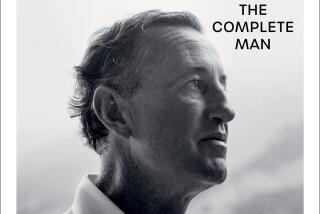Anthony Cave Brown, 77; Wrote About Spy Craft
WASHINGTON — Anthony Cave Brown, a British journalist who wrote several books exploring the inner workings of 20th century espionage, has died. He was 77.
Brown died July 15 at Oak Springs, a nursing home in Warrenton, Va., of complications of dementia.
Early in his career, he was a globe-trotting Fleet Street reporter known as much for his questionable ethics and exorbitant debts as for his journalistic scoops.
Later, Brown turned to writing books about the murky netherworld in which spy craft, warfare and international politics met.
One of his books was about Kim Philby, the British spy who became a Soviet agent and was once Brown’s drinking partner.
As a correspondent for London’s Daily Mail in the 1950s and ‘60s, Brown cut a swaggering figure as he covered the Hungarian revolt against communism and the Algerian war for independence.
In 1959, after visiting Boris Pasternak at his Russian dacha, he smuggled a poem by the Nobel laureate out of the Soviet Union and had it published in the Daily Mail. He claimed that Pasternak had given him a second poem but that he lost it during a night of revelry in Berlin.
Among other achievements, Brown rode aboard the first nuclear-powered submarine, visited the South Pole and secured a face-to-face interview with Egyptian President Gamal Abdel Nasser.
He was based in Paris and later in Beirut, where he enjoyed the Lebanese capital’s night life and its aura of intrigue. He sometimes met Philby for martinis in Beirut before the double agent was unmasked and fled to Moscow in 1963.
His 1994 book about Philby, “Treason in the Blood,” posited the theory that Philby inherited his treachery from his father, a British government official who settled in Saudi Arabia, took a second wife without divorcing his first and tried to undermine British interests in the Middle East.
For his first book, “Bodyguard of Lies” in 1975, Brown examined newly unsealed files to describe Allied efforts to deceive German forces before the D-day invasion in World War II, including false broadcasts and dummies dropped from airplanes to give the appearance of airborne attacks.
He took the book’s title from a statement by British Prime Minister Winston Churchill: “In wartime, truth is so precious that she should always be attended by a bodyguard of lies.”
Brown was born March 21, 1929, in Bath, England, and later moved to London and Luton.
He was a photographer with the Royal Air Force, then worked at a newspaper in Bristol before going to London’s Fleet Street.
He was a resourceful, if occasionally underhanded, reporter who impersonated intelligence officers and repeated barroom confidences if it would help him get a story. Eventually, though, his epic drinking, extravagant spending and cavalier manner began to wear on his employers.
He moved to Washington in 1962 to freelance, then embarked for Australia and Vietnam, where he reported for a television station owned by Rupert Murdoch and ran up monumental expense accounts.
After a year at Stanford University’s Hoover Institution, Brown settled in Washington in 1969 -- “The only reason I live in Washington is because of the Freedom of Information Act,” he said -- and adopted a more sedate life writing about real-world spies.
In 1982, Brown published “The Last Hero,” a biography of “Wild Bill” Donovan, who founded the Office of Strategic Services, the wartime precursor to the CIA.
He chronicled communist inroads in Europe before World War II (“On a Field of Red,” 1981, written with Charles B. MacDonald) and wrote a 1987 biography of British spy chief Sir Stewart Menzies.
His final book, “Oil, God and Gold” in 1999, examined the oil company Aramco, which he called “the origin and the fount of American power in the Middle East.”
His marriage to Caroline Gilliat, the daughter of British filmmaker Sidney Gilliat, ended in divorce.
His companion of 37 years, Joan Simpson, died in March. Survivors include two children from his marriage, Amanda Eliasch of London and Toby Brown of Wiltshire, England; a brother; and two grandchildren.
More to Read
Sign up for Essential California
The most important California stories and recommendations in your inbox every morning.
You may occasionally receive promotional content from the Los Angeles Times.










